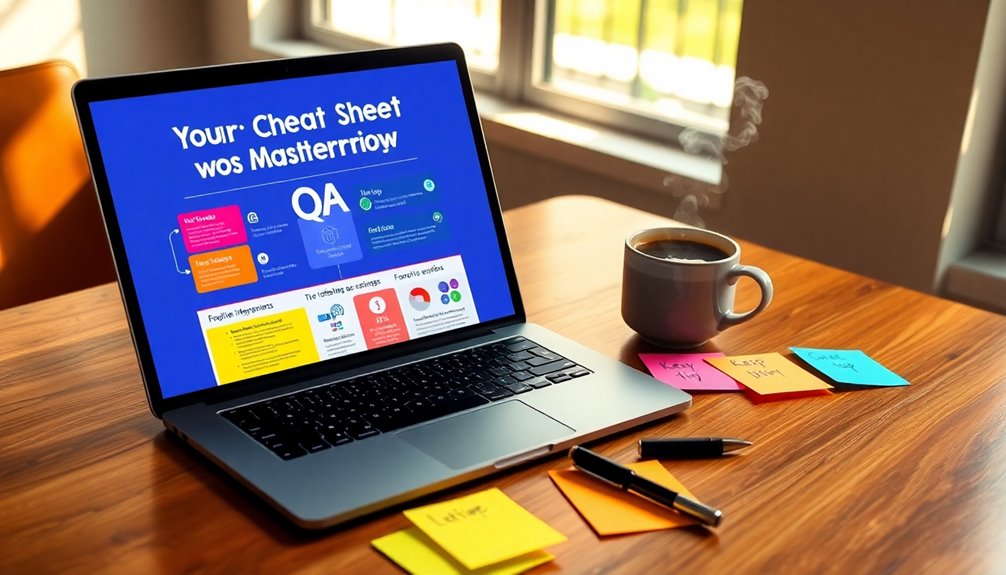To nail English interviews and open global career doors, focus on honing your communication skills. Practice articulating ideas clearly, and use the STAR method for structuring your responses. Understanding cultural nuances is vital; adapt your style to match the interviewer's preferences. Prepare for common questions and engage in mock interviews to build confidence. Networking is essential, as many jobs aren't advertised publicly. Following up promptly after interviews shows your enthusiasm and professionalism. By mastering these areas, you can greatly enhance your interview performance and career prospects. There's much more you can explore to further strengthen your approach!
Key Takeaways
- Master effective communication skills to articulate ideas clearly and build rapport with interviewers, enhancing your chances of success.
- Prepare thoroughly by practicing common interview questions and utilizing the STAR method for structured, impactful responses.
- Research the company culture to align your answers with their values, demonstrating your fit for the organization.
- Cultivate cultural awareness to navigate different communication styles and non-verbal cues, improving your interview performance.
- Network strategically through industry events and LinkedIn to uncover hidden job opportunities and make valuable connections.
Understanding the Global Job Market

Steering through the global job market can feel intimidating, especially with over 1.4 billion people competing for opportunities worldwide. However, understanding the dynamics of this job market can give you a significant edge. Emerging economies in Asia and Africa are set to see a staggering increase of 400 million jobs by 2030, making these regions ripe for talent.
Remote work is reshaping the landscape, with 70% of professionals preferring remote or hybrid roles. This shift breaks down geographical barriers, allowing you to tap into a broader range of opportunities. As you navigate this competitive job market, focus on industries like technology, healthcare, and renewable energy, where the demand for skilled workers is soaring. The World Economic Forum predicts a need for 85 million new jobs in these sectors by 2025.
Cultural awareness and adaptability are essential tools in this global job market. Employers increasingly value diverse teams, so showcasing your ability to work across different cultural contexts will set you apart. By honing these skills, you'll position yourself as a strong candidate ready to thrive in a dynamic, interconnected world. Additionally, developing a strong brand identity can enhance your visibility and appeal to potential employers in this competitive landscape.
Importance of Effective Communication

Effective communication is essential in interviews, as it not only enhances clarity and understanding but also greatly influences hiring decisions. When you convey your thoughts effectively, you set yourself apart from other candidates. Remember, strong communication skills are among the top traits employers seek. Here's why mastering effective communication matters:
- Clarity: It helps you articulate ideas and respond to questions clearly.
- Confidence: Non-verbal cues like body language and eye contact show your engagement.
- Respect: Active listening demonstrates your respect for the interviewer and fosters a positive impression.
- Rapport: Tailoring your communication style to the organization's culture helps build rapport.
- Success: Studies indicate that 86% of workplace failures stem from poor communication. Moreover, effective communication strategies can significantly enhance your chances of success in interviews and networking opportunities.
Preparing for Common Interview Questions

When preparing for an interview, understanding common questions can greatly boost your confidence and ability to respond effectively. Familiarize yourself with questions like "Tell me about yourself," "What are your strengths and weaknesses?" and "Why do you want to work here?" Confirm your answers are concise and relevant to the job description.
Utilize the STAR method (Situation, Task, Action, Result) for behavioral questions. This approach helps you structure your answers clearly, showcasing your skills and experiences with concrete examples.
Research the company and its culture beforehand. This knowledge allows you to tailor your responses to align with their values and demonstrate genuine interest in the role.
Practice mock interviews with a friend or mentor to build your confidence. This practice will also help you receive constructive feedback on your answers and body language, which can make a significant difference.
Lastly, prepare thoughtful questions to ask the interviewer. Doing so not only shows your interest in the position but also helps you assess if the company is the right fit for you. Taking these steps will set you up for success in your interview journey.
Mastering Cultural Awareness

Mastering cultural awareness is essential for making a strong impression in interviews. You need to understand cultural nuances and adapt your communication strategies to connect effectively with interviewers from diverse backgrounds. Building cross-cultural relationships not only showcases your adaptability but also demonstrates your commitment to fitting in with the company culture. Additionally, establishing healthy boundaries can enhance your ability to navigate cultural differences and foster mutual respect during interactions.
Understanding Cultural Nuances
Cultural awareness plays an essential role in maneuvering the complexities of English interviews. Understanding cultural nuances can make a significant difference in how you're perceived by potential employers. Different cultures have unique communication styles that affect both verbal and non-verbal interactions. Here are some key aspects to reflect upon:
- Directness vs. Indirectness: Know when to be straightforward and when to be subtle.
- Non-Verbal Cues: Eye contact, gestures, and body language can vary widely in meaning.
- Business Etiquette: Punctuality, greetings, and dress codes can shape first impressions.
- Respect for Values: Demonstrating cultural awareness can enhance rapport with interviewers.
- Language Proficiency: Understanding idioms and cultural references is crucial for connection.
Effective Communication Strategies
Maneuvering the nuances of communication is key to succeeding in English interviews, particularly in diverse environments. To enhance your effectiveness, adopt effective communication strategies that embrace cultural awareness. Recognizing that non-verbal cues vary across cultures can greatly improve rapport. For instance, while eye contact signals confidence in Western settings, it might be seen as disrespectful in some Asian cultures.
Active listening is another essential strategy. By summarizing and reflecting what others say, you can improve clarity and understanding, reducing miscommunication by up to 30%. Tailoring your language and tone to align with your audience's cultural expectations can lead to a 40% increase in engagement during interviews.
Additionally, practicing cultural sensitivity can enhance negotiation outcomes. Research shows that culturally informed negotiators achieve 20% better results than their less aware counterparts. So, take the time to learn about the cultural backgrounds of those you're communicating with. This knowledge not only prepares you for discussions but also positions you as a thoughtful candidate. By implementing these effective communication strategies, you'll be well on your way to making a lasting impression in any global career opportunity.
Building Cross-Cultural Relationships
Understanding the intricacies of diverse communication styles is essential for building strong cross-cultural relationships. Mastering cultural awareness isn't just a nice-to-have; it's imperative in today's global workplace. With 70% of workplace conflicts stemming from cultural misunderstandings, it's crucial to recognize and adapt your communication accordingly.
To strengthen your cross-cultural interactions, consider these key strategies:
- Engage in active listening: Pay close attention to what others are saying.
- Show empathy: Understand your colleagues' perspectives and feelings.
- Participate in cross-cultural training: Gain confidence and skills for multicultural environments.
- Adapt your communication style: Be aware of how different cultures express themselves.
- Build trust through genuine relationships: Foster connections with your colleagues.
Developing cultural intelligence (CQ) can lead to a significant boost in collaboration and productivity, with teams experiencing 30% better performance outcomes. By investing time in cultural awareness, you not only enhance your relationships but also pave the way for a more harmonious workplace. Embrace these practices, and watch your professional relationships flourish across cultures.
Enhancing Language Proficiency

To enhance your language proficiency, you'll want to practice speaking, listening, reading, and writing daily for at least 30 minutes. Engaging with English through films, podcasts, and conversation clubs not only builds your skills but also deepens your understanding of cultural nuances. Setting clear goals will help you stay motivated and track your progress as you improve.
Language Practice Techniques
Mastering a language requires dedication and effective practice techniques. To truly enhance your proficiency, consider integrating the following methods into your routine:
- Engage in conversation with native speakers to build confidence and improve your speaking skills.
- Utilize language learning apps featuring speech recognition to refine your pronunciation and fluency in real-time.
- Participate in language exchange programs where you can practice English while helping others with their native language in a relaxed environment.
- Immerse yourself in English by reading articles, watching videos, or listening to podcasts, exposing yourself to diverse vocabulary and colloquial expressions.
- Set specific language goals, like learning five new words or phrases daily, creating a structured approach to enhance your vocabulary and comprehension over time.
- Incorporating personalized learning pathways can significantly improve your language acquisition by tailoring techniques to your unique learning style.
Cultural Nuances Awareness
Cultural nuances play an essential role in enhancing your language proficiency, especially during interviews. Understanding these nuances helps you navigate different expressions, idioms, and conversational styles unique to various cultures. This awareness not only improves your interpretation but also engages your interviewers on a deeper level.
Incorporating culturally relevant examples in your responses shows respect for diverse backgrounds, fostering stronger connections. Developing active listening skills is vital, as it enables you to catch subtle cues and cultural references that might not be directly stated. This attentiveness can make a significant difference in your interaction.
Practicing role-playing scenarios that reflect various cultural contexts can boost your adaptability in communication styles. This practice prepares you for the range of interview environments you may encounter, making you feel more confident. Additionally, familiarizing yourself with common cultural practices and etiquette in the target country can help reduce misunderstandings. Understanding the significance of slang can further enhance your ability to connect with interviewers from diverse backgrounds.
Building Confidence Through Practice

Many candidates find that building confidence for interviews comes down to the practice they put in beforehand. When you invest time in practicing your responses, you boost your verbal fluency and reduce anxiety, leading to a more confident presentation. Here are some effective ways to practice:
- Role-play with a friend to get constructive feedback on your body language.
- Engage in mock interviews through online platforms to simulate real interview conditions.
- Record your practice sessions and review them to spot areas for improvement.
- Rehearse answers aloud to enhance clarity and pacing.
- Commit to frequent practice, as it notably increases your self-efficacy. Additionally, participating in online communities can provide valuable support and resources to further enhance your interview preparation.
Leveraging Networking Opportunities

Networking can be a game-changer when it comes to job hunting. Did you know that up to 70% of job opportunities remain hidden from traditional job searches? By engaging in industry-specific webinars and events, you can considerably expand your professional network and boost your visibility among potential employers.
Don't underestimate the power of personalized outreach. Crafting tailored messages on platforms like LinkedIn can improve your response rates by up to 50%. This approach helps you foster genuine relationships with industry professionals who might just have the leads you need for your job search.
Additionally, building a diverse network that includes peers, mentors, and industry leaders can enhance your career prospects. Each connection offers unique insights and perspectives on the job market, which can be invaluable. Furthermore, developing emotional intelligence can help you navigate networking interactions more effectively.
Following Up After Interviews

Following up after interviews is a crucial step that can set you apart from other candidates. By reaching out within 24 to 48 hours, you showcase your enthusiasm and professionalism, leaving a lasting impression on hiring managers. A well-crafted follow-up email can reiterate your interest in the role, highlight key points from the interview, and address any concerns that may have arisen.
Consider these emotional touches in your follow-up:
- Express genuine gratitude for the opportunity.
- Reference specific topics discussed to deepen connection.
- Reiterate your excitement about potential job offers.
- Address any uncertainties that may have come up.
- Maintain a professional tone throughout your message.
Research shows that candidates who follow up have a 30% higher chance of being remembered. Personalizing your message not only demonstrates attentiveness but also reinforces your fit for the position. Remember, a thoughtful follow-up can be the deciding factor in landing those job offers. Don't underestimate the power of your words; make them count! Additionally, be aware of how user consent management can affect your communication strategies, especially when using email marketing tools.
Frequently Asked Questions
How Do You Nail an Interview in English?
To nail an interview in English, you should practice common questions and craft clear, concise answers that showcase your skills. Research the company's culture and values to tailor your responses effectively. Use the STAR method to structure your answers, providing specific examples. Pay attention to your body language and tone, as non-verbal cues matter. Finally, consider mock interviews with a friend to gain feedback and boost your confidence before the real thing.
What Does Nail the Interview Mean?
"Nail the interview" means you successfully showcase your qualifications, skills, and personality during the interview. It's all about making a strong, positive impression on the hiring team. To do this, you need to prepare thoroughly—research the company, understand its culture, and align your responses with its values. Practicing common questions and using the STAR technique can help you structure your answers, while active listening shows your genuine interest in the role.
How Do You Nail an Interview for a Job You Really Want?
To nail an interview for the job you really want, start by researching the company's values and culture. This'll help you tailor your responses and show genuine interest. Practice common questions and use the STAR method to structure your answers. Prepare thoughtful questions to ask the interviewer, demonstrating your enthusiasm to contribute. Finally, send a personalized thank-you email afterward, summarizing key points and reiterating your interest in the position.
How to Pass an English Interview?
"Practice makes perfect." To pass an English interview, start by researching common questions and practicing your responses. Speak slowly and clearly to guarantee your answers are understood. Use the STAR method to structure your responses to behavioral questions, sharing specific examples from your experiences. Be ready to discuss your resume in detail. Finally, don't forget to follow up with a thank-you email, reiterating your interest in the position.
Conclusion
As you plunge into the global job market, remember that nailing English interviews isn't just about language; it's your ticket to amazing opportunities. Coincidentally, the skills you develop—like mastering cultural nuances and boosting your confidence—will not only help you in interviews but also in building lasting professional relationships. So, take a moment to reflect on your journey and embrace these tools. With each interview, you're opening doors to a world of possibilities!









